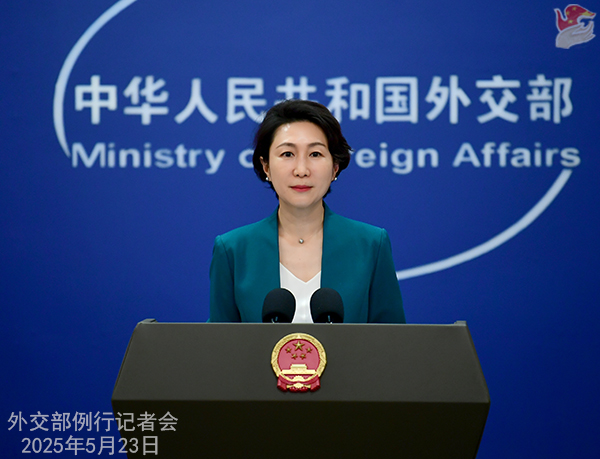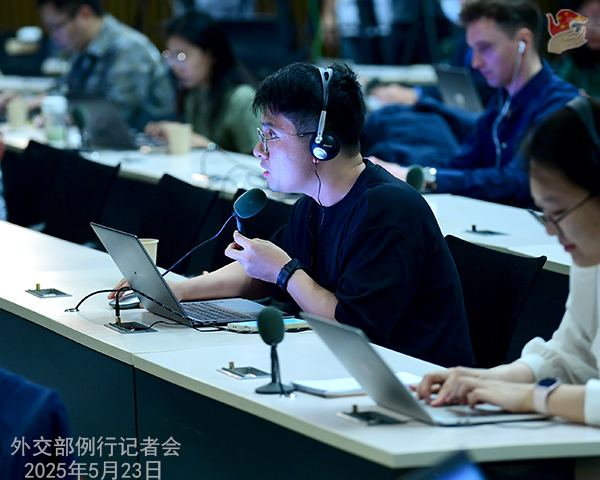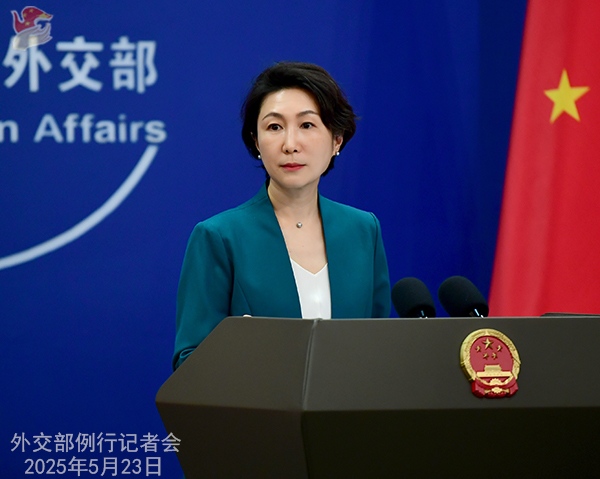
China News Service: The fourth China-Central and Eastern European Countries Expo and International Consumer Goods Fair (China-CEEC Expo) is being held in Ningbo, Zhejiang. Can you share more details with us?
Mao Ning: The fourth China-Central and Eastern European Countries Expo and International Consumer Goods Fair (China-CEEC Expo) opened in Ningbo, Zhejiang on May 22. State Councilor Shen Yiqin attended and addressed the opening ceremony. Richard Rasi, Chairman of the National Council of Slovakia, the guest country of honor, and Meira Hot, Vice President of the National Assembly of Slovenia, also the guest country of honor, delivered remarks respectively. Both Chinese and foreign guests spoke highly of China-CEEC cooperation, noting that with the joint efforts of the two sides, the mutually beneficial cooperation has been strengthened, promising broad prospects for common development of the two sides.
The expo has held over ten key events, including business discussions, investment promotion and people-to-people and cultural exchanges, and is scheduled to hold more than 50 industry- and country-specific events which are smaller in scale but well-designed to unlock opportunities for cooperation in all dimensions. Seven political leaders and over ten senior officials at the vice-ministerial level or above from Central and Eastern European countries as well as over 3,000 foreign buyers from 72 countries and regions attended the expo. Intended procurement is projected to exceed RMB 10 billion.
This expo fully demonstrates that the China-CEEC cooperation mechanism not only gives a boost to trade and economic exchanges, but also promotes people-to-people and cultural exchanges. The expo is still ongoing. We welcome friends from different sectors and other countries to actively participate in the expo to experience in person the vibrancy of China-CEEC cooperation.
Shenzhen TV: A special online meeting of economic and trade ministers from China and ASEAN was held recently. The two sides jointly announced the completion of negotiations on the Version 3.0 China-ASEAN Free Trade Area (CAFTA 3.0). Can you share more details and your comment with us?
Mao Ning: This is indeed good news. It is a key step towards signing the CAFTA 3.0 upgrade protocol. China and ASEAN are firm supporters of economic globalization and multilateralism. The full completion of the CAFTA 3.0 negotiations sends a strong message of supporting free trade and open cooperation. Through building an inclusive, modern, comprehensive and mutually beneficial free trade area, China and ASEAN will open up further to each other and realize common prosperity and development.
Reuters: The Trump administration has revoked Harvard University’s ability to enroll international students and is forcing current students to transfer or lose their legal status. The U.S. Homeland Security Secretary said the university “coordinated with the Chinese Communist Party”, among other reasons for the U.S. government’s move. How does the Foreign Ministry view this given Chinese students make up 20 percent of the international student community at Harvard?
Mao Ning: China-U.S. education cooperation benefits both sides. China opposes politicizing education cooperation. What the U.S. seeks to do will undoubtedly hurt its own image and reputation in the world. China will firmly protect the legitimate and lawful rights and interests of Chinese students and scholars overseas.
Bloomberg: A follow-up to the question on Harvard just now. Specifically, there was a reference to connections with Xinjiang. And earlier this week, there was a letter from U.S. lawmakers sent to the Harvard President demanding information about the school’s links to China’s government and military. For example, they alleged that the university hosted and trained members of XPCC, Xinjiang Production and Construction Corp. This of course was sanctioned by the U.S. side in 2020. So could you specifically address the concerns over the connections between Harvard and Xinjiang and the XPCC?
Mao Ning: Let me reiterate that China opposes politicizing education cooperation and groundlessly attacking and vilifying China. The sanctions you mentioned are illicit and should be lifted immediately.

Global Times: It’s reported that on the Philippines’ narratives on China Coast Guard vessel’s law enforcement activities near Tiexian Jiao, MaryKay Carlson, U.S. Ambassador to the Philippines, said in a post on X on May 22 that the China Coast Guard’s aggressive actions against a civilian mission recklessly endangered lives and threatened regional stability. The U.S. stands with the Philippines in support of international law and a free and open Indo-Pacific. What’s China’s comment?
Mao Ning: The China Coast Guard has released a statement and on-site video footage on the incident. The facts speak for themselves. The Philippines, despite China’s dissuasion, has repeatedly sent people to illegally step on Tiexian Jiao, which is part of China’s Nansha Qundao. That severely infringes on China’s sovereignty, and violates the Declaration on the Conduct of Parties in the South China Sea. China’s response is fully necessary, legitimate and lawful. The Philippines needs to immediately stop its infringement activities and provocations. Otherwise, China will make a resolute response. The U.S. should refrain from using the Philippines to create trouble in the South China Sea and stop undermining peace and tranquility in the South China Sea.
TVB: It was reported that recently Taiwan’s “Hong Cai Tou 6” fishing boat was detained by Japanese official vessels for violating fishing regulations and was then released after paying a huge bail. China last year protested to Japan over its detention of Taiwanese fishing boats. Did China protest to Japan this time?
Mao Ning: The Chinese government attaches great importance to safeguarding the lawful rights and interests of Chinese fishermen, including those from the Taiwan region. According to the China-Japan Fisheries Agreement, Japan has no right to take enforcement measures against Chinese fishing vessels in relevant waters. China has protested to Japan over its detention of the fishing boat “Hong Cai Tou 6”, and asked the Japanese side to immediately correct the wrongdoing, and take effective measures to prevent similar incidents from happening again.
AFP: From earlier this week, there was a shooting outside the Jewish Museum in Washington that killed two people. It is being investigated as a possible antisemitic attack. Does China have any comment on this incident?
Mao Ning: We noted the reports. China condemns all violent moves. We believe the safety of diplomats must be effectively protected.
Bloomberg: Regarding the visit of the Dutch Foreign Minister Veldkamp. He said on Thursday in a meeting with reporters that during his discussions, the Chinese authorities had brought up the issue of easing export controls in relation to semiconductors. Can the Foreign Ministry confirm that this was raised as part of the discussions and offer any further details?
Mao Ning: During Foreign Minister Veldkamp’s visit to China, Vice Premier Ding Xuexiang and Foreign Minister Wang Yi met and held talks with him respectively. The two sides had an in-depth exchange of views on bilateral relations and issues of mutual interest. Foreign ministers of the two countries reached a six-point common understanding. We’ve released readouts on the meetings, which you may refer to.
On semiconductor export control, China has made clear its position on multiple occasions. Semiconductor is a highly globalized industry and its industrial and supply chains came into shape as a result of the choices of both the market and businesses. For some time, certain countries have been overstretching the concept of national security, slapping export control and long-arm jurisdiction, and severely threatening the stability of global industrial and supply chains. China and the Netherlands are highly complementary in the semiconductor sector and our cooperation is mutually beneficial. The two sides maintain close communication through existing channels. China stands ready to work with the Netherlands and the rest of the world to embrace open cooperation and jointly keep the global semiconductor industrial and supply chains stable.
